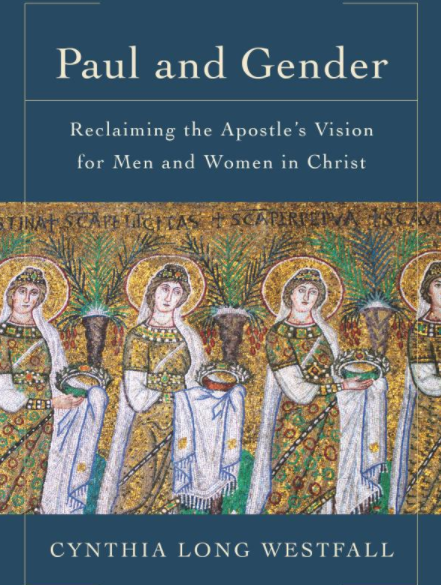 A book that has just come in the mail is by Cynthia Long Westfall and is called Paul and Gender: Reclaiming the Apostle’s Vision for Men and Women in Christ, and I urge you to purchase and read this book — along with me for I will blog through it. For today, however, I want to clip a paragraph from her conclusion, and it’s (yes, yes, yes) provocative but true to my experience. Readers of this blog know that I have dedicated this blog to defend women who are called and gifted, and hence I will be unafraid to disagree with those who either disagree or who make what I deem to be insensitive remarks.
A book that has just come in the mail is by Cynthia Long Westfall and is called Paul and Gender: Reclaiming the Apostle’s Vision for Men and Women in Christ, and I urge you to purchase and read this book — along with me for I will blog through it. For today, however, I want to clip a paragraph from her conclusion, and it’s (yes, yes, yes) provocative but true to my experience. Readers of this blog know that I have dedicated this blog to defend women who are called and gifted, and hence I will be unafraid to disagree with those who either disagree or who make what I deem to be insensitive remarks.
Here is Westfall, and I have reformatted this into separable points:
Gender is a topic about which people of outstanding character disagree.
Yes, that’s so true. I respect as persons many — not all — who are complementarians and I have many complementarian friends with whom I’ve not had so much as an argument. At times both of us can stand toward our views with an almost ironic disposition or laugh at ourselves.
Yet, Westfall’s next point must be taken very seriously. Ideas have implications; at times complementarians have been harsh and brutally insensitive:
However, interpreters with integrity need to take responsibility for the theological trajectories of their conclusions and those of the networks with which they associate. For the Christian population, there must be a determined evaluation of the behavioral outcomes of any belief system: Jesus said that we will know people by their fruit.
Here is where she sees complementarians taking their ideas:
The mandate to subordinate women and bar them from positions of authority has been applied in the congregation and the academy, in some cases with various forms and degrees of disrespect, marginalization, suspicion, mistreatment, and rejection of women, usually in an effort to either maintain control, enforce a standard, or deflect responsibility.
Thinking they are right, they can be insensitive and even more unaccountable:
The prerogative of male leaders and husbands is felt to be such a scriptural priority that there is a lack of accountability and confrontation in cases of abuse, sexual harassment, and incest in the churches.
Why, she asks, the silence about women in the rest of the world?
Not surprisingly, there is not enough interest in addressing the global oppression of women.
The defenders too often deny the cruciform or Christoform nature of Christian behavior, turning instead the worldly way of powermongering:
The exercise of power among male leaders is also problematic as influential leaders use their public or institutional influence to inappropriately dominate and enforce doctrinal uniformity over their colleagues. Identifiable propaganda techniques and the employment of blatant power plays have been used to ruin careers.
Ideas have implications; one of which is systemic:
There is a transparent connection between these behaviors and the theology of power in which this behavior is systemic.





